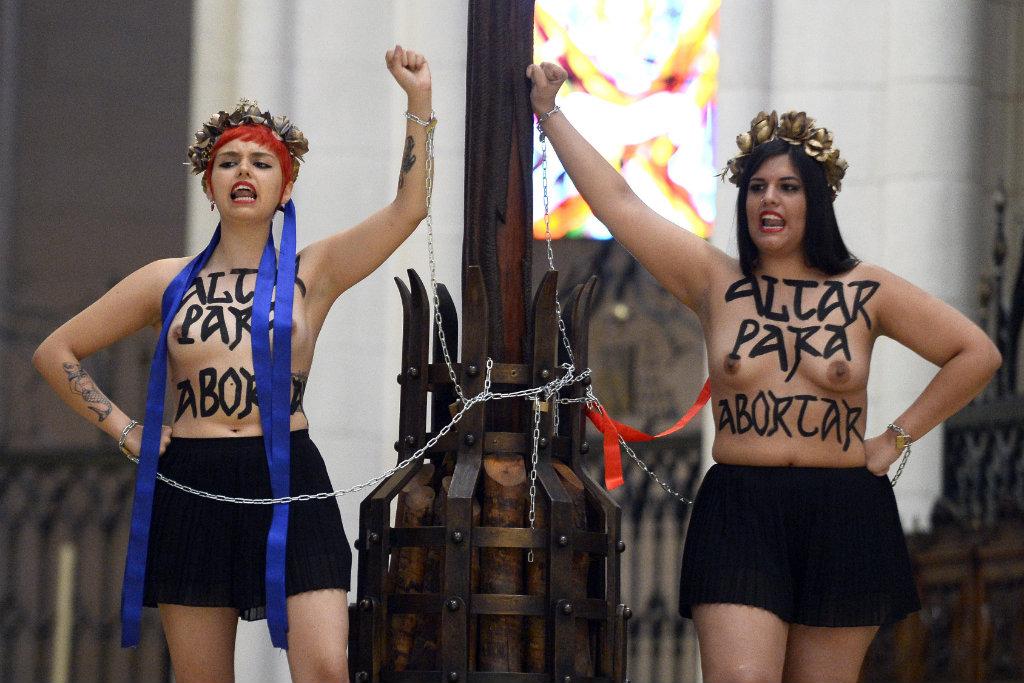Spanish prime minister drops restrictive abortion bill after dissent
Bare-breasted activists of feminist movement Femen protest, chained to a cross, against a reform of the country’s abortion law at the Almudena Cathedral in Madrid on June 13, 2014.
Last week Spain’s prime minister abandoned an abortion reform bill that would have become one of the most restrictive abortion laws in Europe, prompting cheers, jeers and the resignation of Justice Minister Alberto Ruiz-Gallardón, the bill’s architect.
Prime Minister Mariano Rajoy on Tuesday rejected the proposal, which was presented in December of last year and would have effectively overturned a 4-year-old law allowing women access to free abortions up to the fourteenth week of pregnancy.
"As president of the government, I have taken the most sensible decision," Rajoy said in a press conference to reporters in Madrid.
Gallardón on the same evening announced the end of his political life, saying it is his “duty to [resign] given that I have not been able to turn the bill into law.”
The bill — similar to existing laws in Argentina and Nigeria, among others — proposed limiting access to abortion to cases of rape or serious health risk to the mother. But it had a deeply divisive effect within the ruling center-right People's Party (PP), and was unpopular amid the majority Catholic citizenry.
According to a Metroscopia poll conducted earlier this year, 68 percent of People’s Party voters were against the reform along with 59 percent of Catholic voters. The same study found that 75 percent of voters said there is no social demand for reform and 78 percent called it “unnecessary.”
The government, Rajoy said, had “done all it could” to broker a consensus and fulfill the PP’s 2011 campaign promises. But although the party’s absolute majority in parliament allows it to pass laws without the support of other parties, dissent among its own members, street protests and “complaints from leading doctors” became major obstacles.
In a letter to then-Justice Minister Gallardón dated May 2014, women’s rights and human rights groups, including Human Rights Watch, highlighted key concerns with the legislation “for the protection of the life of the fetus and of the rights of pregnant women.”
Chief among those concerns were issues present with similar battles over reproductive rights in other countries, reminiscent of those The GroundTruth Project recently reported on in Argentina. Barriers to women’s access to abortion services created by inadequate regulation of the declaration of conscientious objection by medical providers, for example, is one such issue.
Regulations stipulating that abortion access be approved by more than one doctor, that a victim of rape first file a police report, or that a potential patient seek counseling and adhere to a mandatory waiting period can also be found in other European countries and in some states throughout the United States.
“The broadening of the scope of conscientious objection in Spain under the draft legislation, with weaker safeguards to prevent the exercise of conscientious objection from undermining access to quality care, raise concerns that women may face significant obstacles finding health care providers who will facilitate their access to safe, legal abortions,” the letter detailed.
According to the World Health Organization (WHO) and the UN Committee on the Elimination of Discrimination against Women (CEDAW), restrictive abortion laws tend to have minimal impact on the number of abortions carried out in any given country. Contrary to their intent, in most cases, restrictive laws further exacerbate the problem by driving women to clandestine circuits that are often unsafe. WHO global studies have indicated that 13 percent of maternal deaths are attributable to unsafe abortions.
Further, the United Nations Human Rights Committee (HRC) as well as the CEDAW Committee have “repeatedly expressed concern about the relationship between restrictive abortion laws, clandestine abortions, and threats to women’s and girls’ lives."
In Spain, reactions to the bill’s rejection proved just as divisive as the attempt to pass the legislation. Opposition politicians and groups like the State Federation of Feminist Organizations celebrated — declaring that “feminism halted Gallardón’s law,” as it came to be known — and pro-life groups like Derecho a Vivir, Right to Life, called for a campaign against the prime minister.
"We find ourselves with a prime minister who has betrayed his core supporters," said Derecho a Vivir spokesperson Gador Joya. "Mr. Rajoy has shown he is not to be trusted because he does not have principles."
With their campaign, the group said it hopes to curb the votes some 11 million citizens who had previously voted for Rajoy “based on election promises.” Thousands are already participating in marches across the country and sharing on social media using the hashtag “#MarchaVida.”
But Carmen Monton, a member of the opposition Socialist Party, said, "it was about time Rajoy realized he cannot meddle with women's freedom."
Still, Prime Minister Rajoy assured opponents, the government plans to move forward with efforts to amend the existing 2010 law so that girls under the ages of 17 cannot terminate a pregnancy without parental consent.
The practice was initially decriminalized in Spain in 1985 but restricted to cases of “malformed fetuses, rape or potential mental or physical damage to the mother.” Since 2010, women have had access to the procedure for any reason, and without justification, through the first 14 weeks of pregnancy.
Eighty-eight percent of Europe’s countries allow the procedure when a fetus is malformed or in cases of rape or incest, according to WHO. Human Rights Watch said access remains barred in various countries, including Ireland, Poland and Malta.
Approximately 25 percent of the world’s population lives in countries with limiting abortion laws, according to Women on Waves — an organization that has created an interactive map of the world’s abortion laws — with most living in Latin America, Africa and Asia.
More on GlobalPost: Argentina's abortion battle pushes women into legal labyrinth
